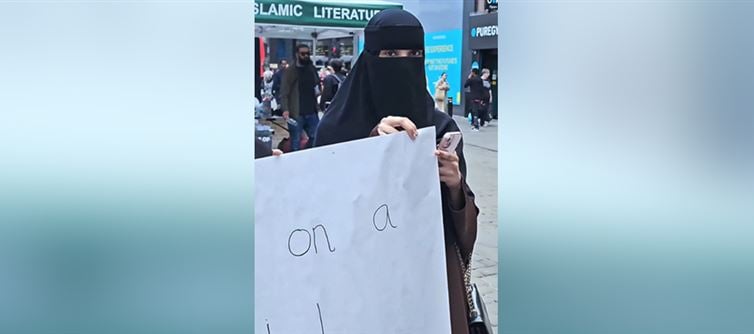
In a bustling UK city center, a seemingly innocuous outreach effort took place as two Muslim women in full burqas stood peacefully holding a sign that read, “Try on a hijab.” The initiative, often part of interfaith or awareness campaigns, is generally meant to educate the public about Islamic practices, offer cultural engagement, and dispel myths surrounding Muslim attire. These efforts are usually voluntary and non-coercive, aiming to build bridges between communities through conversation. However, in an increasingly polarized social climate, such events can also provoke strong and conflicting reactions from bystanders.
On this occasion, a self-proclaimed british patriot approached the women with visible agitation. The confrontation, captured on mobile phones by several onlookers, quickly drew attention. The man accused the women of pushing an ideology he deemed incompatible with british values, arguing that promoting religious clothing in public spaces was a form of subtle proselytization. The women remained composed, attempting to explain that the gesture was optional and meant for awareness, not conversion or imposition. Nonetheless, the incident escalated into a verbal clash, reflecting the larger cultural tensions simmering beneath the surface in multicultural societies.
This encounter speaks to broader questions around identity, integration, and freedom of expression in the UK. For some, initiatives like “Try on a hijab” are symbols of pluralism and inclusion; for others, they provoke anxieties about cultural change and perceived threats to secular or national identity. Both sides often view themselves as defending values — one side advocating for tolerance and coexistence, the other for tradition and sovereignty. In a society that prides itself on free speech and mutual respect, such interactions underscore the need for more open, informed dialogue rather than reactionary hostility.
On this occasion, a self-proclaimed british patriot approached the women with visible agitation. The confrontation, captured on mobile phones by several onlookers, quickly drew attention. The man accused the women of pushing an ideology he deemed incompatible with british values, arguing that promoting religious clothing in public spaces was a form of subtle proselytization. The women remained composed, attempting to explain that the gesture was optional and meant for awareness, not conversion or imposition. Nonetheless, the incident escalated into a verbal clash, reflecting the larger cultural tensions simmering beneath the surface in multicultural societies.
This encounter speaks to broader questions around identity, integration, and freedom of expression in the UK. For some, initiatives like “Try on a hijab” are symbols of pluralism and inclusion; for others, they provoke anxieties about cultural change and perceived threats to secular or national identity. Both sides often view themselves as defending values — one side advocating for tolerance and coexistence, the other for tradition and sovereignty. In a society that prides itself on free speech and mutual respect, such interactions underscore the need for more open, informed dialogue rather than reactionary hostility.




 click and follow Indiaherald WhatsApp channel
click and follow Indiaherald WhatsApp channel